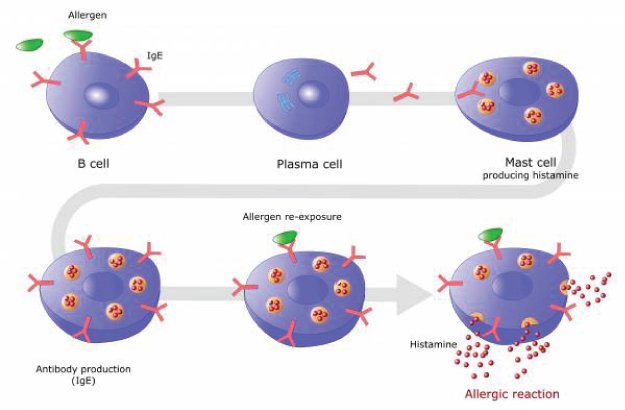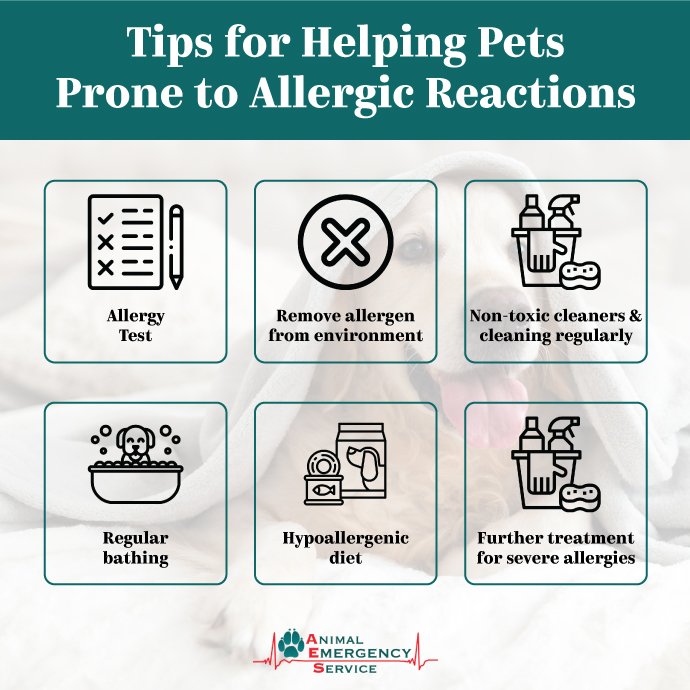Dog allergy is a state of hypersensitivity or over-reactivity of a dog's immune system to a particular substance called an allergen. Most allergens are proteins from foods, plants, or insects.
Exposure to allergens sensitizes the dog's immune system, and a subsequent exposure to the same or related allergen causes over-reactivity.
Usually, a dog's immune system protects them against infections or diseases, but with allergies, their immune response can be harmful to the body.
The immune reactions involved in allergies are very complex. Most of these reactions involve allergen protein molecules combining with antibodies in the dog's blood, then attaching to a type of cell referred to as a mast cell. Mast cells are found in many tissues all over the body.

Reference Source from: Breakingmuscle.com
When antigens and antibodies react with mast cells, the mast cells release potent chemicals (e.g., histamines) that cause local inflammation, such as swelling, itching, and redness. This local inflammation causes various signs associated with allergic reactions in dogs.
Skin Allergies
Skin allergies are the most common types of allergies in dogs. The three main causes of skin allergies include food allergies, flea allergy dermatitis, and environmental allergens.
Food Allergies
What most dog owners mean when they say that their dog has a food allergy is that their canine friend has a food sensitivity, also referred to as food intolerance. Unlike true allergies, food sensitivities do not involve an immune response. Instead, they are a gradual reaction to an offending ingredient in the dog's food, for example, eggs, beef, chicken, soy, wheat, corn, or milk.
A dog with food sensitivity can present several symptoms, including dermatologic signs such as poor skin and coat, itchiness, and chronic ear or foot infections, or gastrointestinal signs such as diarrhea and vomiting.
Dog owners can best diagnose and treat food allergies by working closely with their vet to manage their dog's symptoms and discover the ingredient causing the allergic reaction. Limited Ingredients Formula can be a great help.
Flea allergy dermatitis
“Flea allergy dermatitis is an allergic reaction to flea bites.” according to Anna Burkein her article dog allergies.
Some dogs are allergic to flea saliva, which makes them extremely itchy, particularly at the base of the tail. Their skin may also become inflamed, red, and scabbed.
Environmental allergens
Environmental allergens such as pollen, dust, and mold can result in atopic dermatitis or an atopic allergic reaction.
“With atopy, the dog's immune system overreacts to an airborne or inhaled allergen” by VCA Animal hospitals..
These allergies are mostly seasonal, so dog owners may notice their dogs itching during certain times of the year.
Skin allergies pose a risk of secondary infection. As the dog scratches, licks, and bites his skin, he risks opening up his skin to bacterial and yeast infections that may require treatment.
Acute Allergic Reactions
Acute allergic reaction is perhaps the most alarming type of dog allergy. Like humans, dogs can go into anaphylactic shock if they have a severe allergic reaction. This can often be fatal if not treated. Vaccine reactions and bee stings, among others, can result in an anaphylactic response in some dogs.
Therefore, it is important to keep an eye on your canine friend following the administration of a new vaccine, drug, or food item. Dogs may also develop facial swelling and hives in response to allergens. Swelling of the face, lips, throat, earflaps, or eyelids may look serious, but is not fatal, and veterinarians can treat the swelling with an antihistamine.
Speak to your veterinarian about the issue immediately.
Symptoms of allergies in dogs
The most common symptom of dog allergy is itching of the skin, either in one area or all over the dog's body. In most cases, the symptoms involve the respiratory system, with sneezing, coughing, and/ or wheezing. Allergic symptoms may sometimes affect the digestive system resulting in diarrhea and vomiting.

Treatment of dog allergies
Treatment of flea or insect bite allergy
Strict flea control is vital because one flea can be a problem for a dog with flea allergy dermatitis. This can be difficult considering the life cycle of fleas, but monthly home treatment and flea preventives allow you to provide an environment free from fleas for your pooch.
Your vet can give you tips on how to protect your dog from fleas. In cases of severe itching, or when strict flea control is not possible, your vet may prescribe steroids or antihistamines to block the acute allergic reaction and give immediate relief. He may also prescribe an appropriate antibiotic if a secondary bacterial infection is present.
Treatment of food allergy in dogs
In most cases, food allergy does not respond well to corticosteroids and other medical treatments. Treatment of food allergy requires identification of the offending components and doing away with them. The most accurate way of testing for food allergy in dogs is with an elimination diet trial using a hypoallergenic diet.
The allergic dog must eat the special diet exclusively for 8-12 weeks because it takes a minimum of eight weeks for all other food products to be eliminated from the dog's body. Your vet will then advise you on how to proceed, if a response and improvement of your dog's clinical signs occurs.
It should be noted that an elimination diet will not be considered valid if the diet is not fed exclusively. All table food, flavored vitamins, and treats must be discontinued during the testing period.
Are you worried about where to get these special diets? Zignature has a solution for you, with 16 unique formulas are available, inclusive of wet, dry, and treats.

Zignature has recently launched an Exclusive Trial Feeding Programme for paw-rents who are exploring solutions for their allergic furkids, or those who are just looking for the best suitable food for canine companions.
If you are interested, you may register to join the Zignature Exclusive Trial Feeding Programme here, and it is FREE.
Treatment of inhalant allergy in dogs
Treatment of inhallant allergy in dogs largely depends on the length of the specific allergy season. It may involve anti-inflammatory therapy, Shampoo therapy, or Hyposensitization or desensitization therapy.
Anti-inflammatory therapy involves treatment with antihistamines or drugs such as corticosteroids, which quickly block the allergic reaction in most cases. Supplementation of the dog's diet with fatty acid can improve the response to antihistamines and steroids in most cases. High-quality formulas with essential fatty acids, beneficial amino acids, and antioxidantshelp in easing the allergic reactions.
Shampoo therapy involves frequent bathing with a hypoallergenic shampoo. This shampoo can be soothing to the itchy and inflamed skin. Dog owners should ensure regular bathing with shampoo as it helps rinse out allergens in and out of the dog's coat that can be absorbed through his skin.
Lastly, in Hyposensitization or desensitization therapy, allergy shots or an allergy serum can be given to the patient once the offending antigen has been identified.

Tips for helping pets prone to allergic reactions, from Animal Emergency Service
The Takeaway
Find out what are the root cause(s) of your dog’s allergies, remove the allergens from his environment, be it the food or environmental allergies such as pollen and dust. Be sure to feed your dog a complete and balanced diet to help them thrive.
For further advice on preventions and treatments, speak with your vet.
Share this Post:







